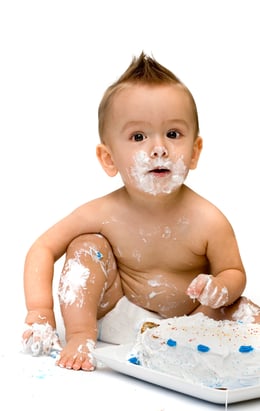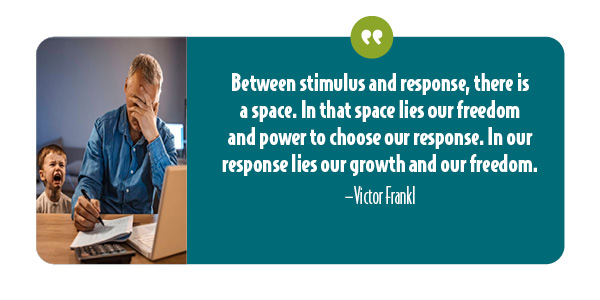When my son was only two, I discovered the power of resiliency! He and I had just picked up a vanilla sponge cake from the bakery, a special order for a friend’s surprise birthday party. I carefully tucked the square white box on the floor between the two front seats of our family minivan. Parking in our driveway, I unhooked the quick-release on my son’s car seat so he could climb down, and I got out of the van to help him out. You won't believe what I found next!
Estimated reading time: 4 minutes

Opening the sliding door, I was shocked to find him sitting proudly on the cake box with a big grin on his face. With his adorable toddler sweetness, he squealed, “It’s a perfect size seat for me, Mom!” It did look an awful lot like a booster seat. This kind of situation is when resiliency as a parent comes in handy!
Of course, this situation is minuscule in the face of a pandemic or major challenge, but what we need as parents no matter how small or big the challenges is resiliency.
Every family has stories like these—the teenager who gets a fender bender within months of getting their driver's license; the entire roll of toilet paper unrolled by a toddler (right now that might seem a lot more agitating!); a prized flowerbed of tulips stripped bare by a gleeful child making a bouquet for mom, or the nine-year-old girl who put on red lipstick and decorated the living room walls with kisses as a Valentine’s Day surprise for her parents! (As you can imagine, these gestures were not received in the same vein as they were intended!)
Trust me; parents need resiliency—at all times! And children need resilient parents to develop high self-esteem to thrive.
So What Is Resilience and Why Is It Important?
The meaning of resilience is the capacity to recover quickly from difficulties, disruptive change, or misfortune without feeling overwhelmed or reacting negatively with charged emotions. We need this now more than ever with everyone confined to their homes.
 A parent faces continual upheaval and change, even if we're only tripping over toys sprawled across the floor, comforting a clinging toddler, or dealing with siblings fighting.
A parent faces continual upheaval and change, even if we're only tripping over toys sprawled across the floor, comforting a clinging toddler, or dealing with siblings fighting.
Parenting children and teens is a complex, 24-7 job with no prior training. And children's developing minds are hungry to learn and explore, which can be tiring for parents. Parenting itself is so demanding that nature devised a natural defense: cuteness.
Yep, scientific studies show that cuteness helps infants to survive by eliciting caregiving. But whether you're a new parent or a veteran, you've already discovered that cuteness only goes so far—and so does our patience!
When we react angrily, yell, or seek to control our children's behavior, we miss major opportunities for teaching and positively influencing development. Resilient parenting is visionary parenting and now is a time to lock into a vision of a new "normal" and create new rituals and routines that are calming and bonding. And we are required like never before to root into our values and cultivate moral character while building emotional fitness. No way around it: resiliency is critical for parents.
Resilience—the Hallmark of Emotional and Social Intelligence
Resilience, the hallmark of emotional and social intelligence, requires multiple skill sets. Below are qualities of highly resilient people:
- self-awareness with an openness to differing opinions and new ideas
- focuses on what they can change (instead of what they can’t)
- easily and quickly resolves conflict
- sense of humor
- self-compassion; acceptance of imperfection and mistakes
- the ability to give and receive support with a strong social network
- self-motivated
- realistic optimism
- adapts to change
- expresses their emotions honestly and appropriately
- perseveres when challenged or things get hard
- healthy boundaries
So how do we promote resilience in ourselves? At the top of the list is self-care.
Emotional Fitness and Resilience Begins with Self-Care as a Parent
Imagine you have two “best friends” who handle things very differently.
 Scenario #1: You meet your best friend at your favorite restaurant for lunch. You are just digging into your salads when she says, “Can I tell you the cutest story?” She then relates the whole saga of ordering a cake for her friend’s birthday, picking it up with her two-year-old, and then finding the highlight of the birthday celebration getting smashed by said two-year-old’s posterior. You both laugh until you cry. Then you move on to talking about the books you’re reading, figuring out the next outing with your girlfriends, and swapping your latest discoveries in permaculture or kick-boxing.
Scenario #1: You meet your best friend at your favorite restaurant for lunch. You are just digging into your salads when she says, “Can I tell you the cutest story?” She then relates the whole saga of ordering a cake for her friend’s birthday, picking it up with her two-year-old, and then finding the highlight of the birthday celebration getting smashed by said two-year-old’s posterior. You both laugh until you cry. Then you move on to talking about the books you’re reading, figuring out the next outing with your girlfriends, and swapping your latest discoveries in permaculture or kick-boxing.
No problem here. That’s a mom with emotional resilience!
Scenario #2: Your best friend calls you in tears canceling your luncheon date. (She never has time to get together, and her phone calls are usually desperate.) She has just blown up at her two-year-old—after promising herself for the umpteenth time that she would never do that again. But he sat on the cake she had just bought for her friend’s birthday and destroyed it. She can’t possibly replace it because it’s too late to get another cake, even if she had the money to buy one. Besides, the whole celebration is ruined because her two-year-old is crying, and she is ready to call 911 for herself!
It’s pretty obvious even to a casual observer that friend #2 is on a very, very short fuse. As usual, she is not taking care of herself and has a ton of drama in her life. Self-care is just that—care of self. No one can do it for us, but
We all have a never-ending list of to-dos and a flood of demands coming from every direction. The primary difference is whether we take care of ourselves or not.
Self-Care Is the Foundation of Resilience and Loving Parenting
Resiliency, learning how to stay calm under pressure, and avoiding "parenting fails" require mindfulness and self-awareness. It's vital that we pay attention to how full our schedules are and if we are living up to our values. Are you allowing a hectic schedule to create unnecessary exhaustion, meltdowns, and reactions with those we love? Diminished self-care equals lowered resilience.
Will you take time for yourself so you can be your best self for your children?
It’s OK to start small, but start! If you make taking care of yourself a priority, you may find yourself enjoying your child a lot more too.
My two-year-old cake squasher is grown now, and I really can’t remember what I had been doing in the days leading up to the cake smashing. But I must have been taking pretty good care of myself because my sense of humor won out. I picked up my son, kissed him, and I laughed. My friend and our children gathered on schedule for her birthday party and gobbled up the smashed cake with our fingers. It was a unique (and messy) event that turned into a cherished memory for all of us.
| For support and parent coaching, reach out to us at support@heartmanity.com. |
Parenting Practices that Promote Resilience
Make a regular practice of appreciation and gratitude to build greater resilience as a parent.
Science shows that a daily gratitude practice reduces anxiety, promotes positive emotions, increases resilience, and strengthens relationships. A small and simple practice for such far-reaching results. As a parent coach and behavioral consultant, I hear about a lot of challenging behaviors. One of the things that I consistently recommend to parents, especially when their patience is strained, is to think of three things they love about their child. Or several things they're grateful for. You cannot maintain frustration or anger when entertaining thoughts of love or gratitude.
As a parent coach and behavioral consultant, I hear about a lot of challenging behaviors. One of the things that I consistently recommend to parents, especially when their patience is strained, is to think of three things they love about their child. Or several things they're grateful for. You cannot maintain frustration or anger when entertaining thoughts of love or gratitude.
| Related reading: "Practice Gratitude for a Positive Attitude." |
The Power of the Pause
In the landmark work of Man's Search for Meaning, Frankl pinpoints an extraordinary perspective on the power of the pause. Pressing your pause button at the height of emotions is a critical step in all coping and self-calming strategies. Learn to pause, and you'll be forging greater resiliency.
 Reframing Your Perspective
Reframing Your Perspective
Stress and unexpected changes are unavoidable in our busy lives. Being able to change our perspective at will is vital.
It’s not what happens to us; it’s what we conclude about the experience that either encourages or discourages us. And our emotions are also tremendously impacted by our perception.
Reframing a negative experience to a more positive frame helps modulate emotions and changes how we experience and react to stimulus in the future. The next time you're heading down a rabbit hole of negativity or anxiousness that isn't serving you as a person or a parent, try reframing.
You begin this shift by asking simple questions to engage your cognitive abilities. Below are some examples:
⇒ "What's another way of looking at this situation?"
⇒ "If you were talking to a good friend with the same challenge, what would you say to them?"
⇒ "Is there another way to interpret this person's behavior?"
Building resiliency will assist you in creating a happier, healthier, and calmer life and family. The skill takes practice, and it's worth the effort.
For more on self-care: check out the Resilient website with more ideas.And if you'd like a parent coach to help you, empowering parents is one of Heartmanity's specialties. Check out our parenting resources.








